American Catholics Celebrate Five Years of Ignoring Laudato Si'
Pope Francis is beaming in literally every photo that's ever been taken of him except this one.
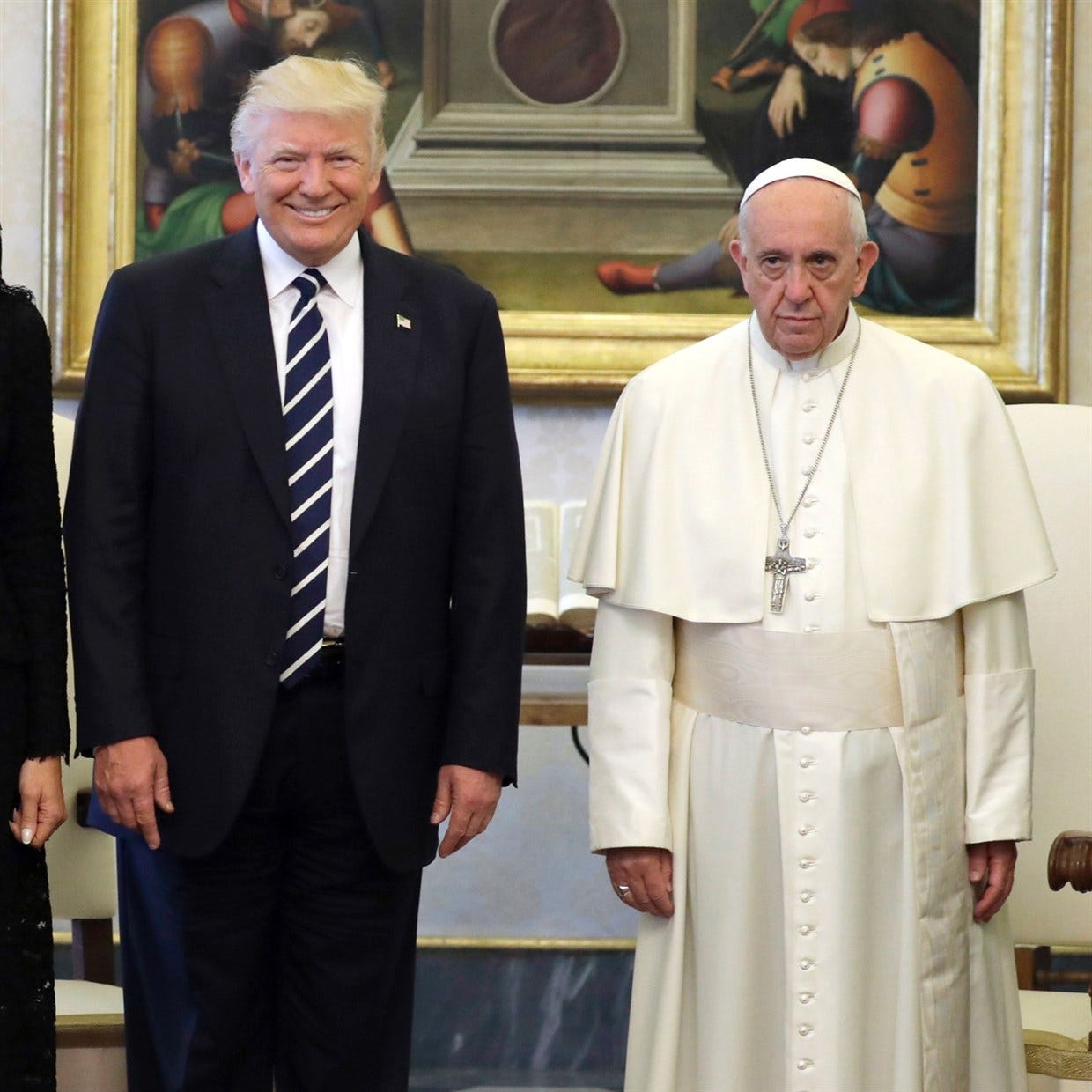
“When nature is viewed solely as a source of profit and gain, this has serious consequences for society. This vision of “might is right” has engnedered immense inequality, injustice and acts of violence against the majority of humanity.”
- Pope Francis, Laudato Si’
“The only framework capitalism can thrive in is dystopia. Fuck all the fakers acting like they’re interested in hearing us when we yell, “Hold accountable the architects of hopelessness and neverending violence!””
- Jeff Rosenstock, “No Dream”
On June 18 of 2015, Pope Francis published his first full encyclical, Laudato Si’: On Care For Our Common Home. While most refer to the encyclical as focused on the moral questions of climate change and environmental justice, that’s really an oversimplification. The full 45,000-word piece covers a lot of ground beyond just the environment: political questions of inequality, labor rights, access to water and food and housing, the debt of the global south, mass extinctions and biodiversity, and many other issues are addressed in the context of the failure of individualism and an unceasing hunger for profit, and the Pope emphasizes the dire need to restore ideas of collective responsibility and action in order to save the Earth and each other. If it’s anything, it’s a unprecedented ecological framework for understanding moral issues, one that emphasizes repeatedly that moral issues cannot be tackled in isolation, but exist in a living, breathing web of connected problems, which require a collective political and moral effort from all of humanity to address.
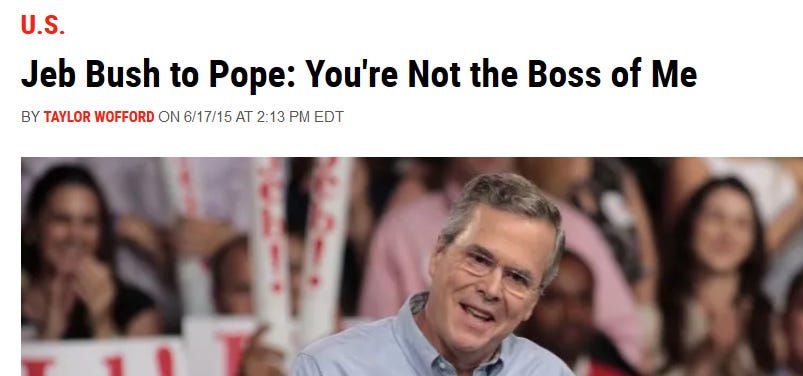
The release of Laudato coincided with the early days of the U.S. presidential primary, one that happened to set the record for the largest number of Catholics to ever run for president at the same time. To be clear, I don’t think a single candidate from 2016, in either party, has ever read Laudato, but several of them definitely heard “the Pope wrote a thing saying climate change is something we should give a shit about” and decided to denounce it as quickly as possible:
Jeb Bush: “I hope I'm not going to get castigated for saying this by my priest back home, but I don't get economic policy from my bishops or my cardinals or my pope. I think religion ought to be about making us better as people and less about things that end up getting in the political realm."
Rick Santorum: “The church has gotten it wrong a few times on science, and I think we probably are better off leaving science to the scientists and focusing on what we’re good at, which is theology and morality.”
Marco Rubio: “Your Holiness, our government can’t control the weather, and neither can the American people. But God blessed America with abundant coal, oil, natural gas.”
Chris Christie: “I just think the Pope is wrong. The fact is that his infallibility is on religious matters, not on political ones.”
There were many other Catholic candidates, but nobody gave a shit what Bobby Jindal or George Pataki had to say.
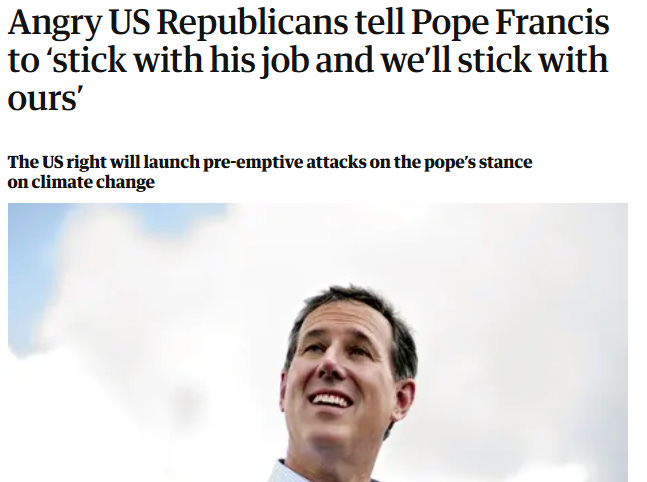
Of course, all of these guys are full of shit, since they’ve cited their Catholic faith all of the time in their political decisions. Jeb Bush bragged about his anti-abortion views being informed by his Catholic faith, to applause, during a primary debate; as governor of Florida, he fought to keep Terry Schiavo on life support, again citing his faith life as justification (meanwhile, Schiavo’s family’s media strategy was being run by religious activism shitheel and failed country musician Randall Terry). Rick Santorum literally campaigned as “a Catholic missionary in the Senate”, and is now an early investor in the world’s first Catholic cryptocurrency, perhaps the single dumbest clause in the single dumbest sentence I’ve ever written
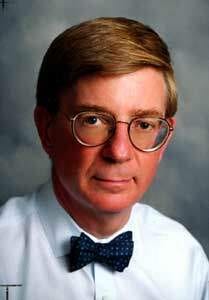
But rest assured that it wasn’t just politicians who chose to speak out against Laudato; Catholic op-ed writers had to pile on as well. National columnist George Will (above), whom Stephen Colbert once described as a “cursed ventriloquist dummy”, blasted the Pope as one who “stands against modernity, rationality, science and, ultimately, the spontaneous creativity of open societies in which people and their desires are not problems but precious resources. Americans cannot simultaneously honor him and celebrate their nation’s premises.”
And a Catholic writing that anyone who supports the Pope must hate America is pretty impressive, but I knew that the worst take was going to come from the all-time record-setter of worst Catholic takes, First Things magazine. Sure enough, editor R.R. Reno, the same man who just had to publicly apologize in the pages of First Things for his weeks-long meltdown around pandemic social distancing being a conspiracy to destroy religion in America, wrote a real banger when Laudato came out five years ago, taking on “the authoritarian consensus about global warming that actively suppressed dissent, as Climategate revealed,” a phrase which has perhaps not aged super-well.
Weirdly, Reno’s critique of Laudato is that it’s too “anti-modernist”, which makes no sense coming from a magazine whose entire purpose since its founding has been to return American Catholicism back to around the year 1948. As Reno puts it:
“If global warming poses a dire threat to humanity—and it may—we will need all the moral strength, scientific integrity, economic vitality, and political legitimacy that Western modernity can muster. The same goes for the pressing problems of poverty and development. Instead of the voice of denunciation, we need the Church’s counsel and guidance. We all need to repent. But when it comes to pressing ethical problems, revolution is a dangerous game to play.”
Again, Reno just became slightly infamous for his reaction to the COVID pandemic, in which he loudly rejected all sources of moral strength, scientific integrity, economic vitality, and political legitimacy around him because it caused him a small level of inconvenience, and fancied himself somewhat of a revolutionary by going to “underground” Mass in defiance of stay-at-home orders. Just like the presidential candidates, he’s picking and choosing when to deploy his one argument in order to affirm what he already believes. This isn’t complicated: it’s called being a hypocrite if you’re smart, and being an idiot if you’re not.
On Pentecost 2015, Pope Francis published Laudato and American politicians tried to undercut it. On Pentecost 2020, our nation's capital city was on fire, after a long night of civil unrest, brought on by a string of police killings, in the context of several years of rising tides of white supremacist violence, exacerbated by double-digit unemployment, brought on by a new Great Depression, kindled by an increasingly degregulated economy, triggered by a global pandemic, accelerated by mass incarceration and poor working conditions, ignored so the rich could get richer, due to protests by people who don’t believe in public health, encouraged by a white supremacist president who actively encouraged violence and disdained peaceful protest, who a year ago shut down the federal government out of spite, enabled by legislators who stay in office through dark money and voter suppression and gerrymandering, elected by voters afraid of immigrants and refugees, spurred to leave their country because of interlocking wars and climate crises. And the possible climate apocalypse isn't going away, even if we feel like another apocalypse is happening right now, and “apocalypse” isn't a word that's supposed to have a plural.
This - all of this - is an ecological problem, and we are ecological beings. Laudato teaches us that it is folly to assume that each of these problems exist in isolation, or that we can act in isolation to solve them, and almost nobody in power, in the church or in Washington, has read it. At one point in the encyclical, Pope Francis throws up his hands and asks “What would induce anyone, at this stage, to hold on to power only to be remembered for their inability to take action when it was urgent and necessary to do so?” I still don’t have an answer.
The church’s moral witness in this moment is failing almost everywhere. The USCCB leadership heaps praise on Donald Trump during campaign events where he declares himself “the greatest president in the history of the Catholic church”, thinking that they can get their anti-abortion judges and not worry about any other issues, with no long-term repercussions anywhere else in society. Bishops sue governors to defy stay-at-home orders, failing to understand the public health emergency and the risk it poses to holding Mass safely. After all of this, and after Trump tear-gassed peaceful protestors, including clergy, at an Episcopal church, the Knights of Columbus welcomed him with open arms at the Shrine of St. John Paul II, in the name of promoting “religious freedom”, maybe the cruelest irony that we’ve seen from the American Catholic church in the past four years. They all looked at their options and decided that these trade-offs were the best ones, when Laudato would have told them otherwise, that trading off in the first place was the wrong choice.
But it’s not like the church had much in the way of moral credibility to begin with. The Archbishop of DC was once Theodore McCarrick, who was outed in 2018 a sexual predator, got defrocked, and was exiled to a remote church in Kansas. His successor was Don Wuerl, who was outed in 2018 as a guy who protected sexual predators, and was forced into early retirement. The entire sexual abuse crisis in the American church - which we still haven’t fixed! - is the work of men that don’t see themselves as connected to the people they serve, that see their top priority as protecting themselves at all costs, no matter how much it damages their ability to minister to the world. The ecology of the church in society be damned.
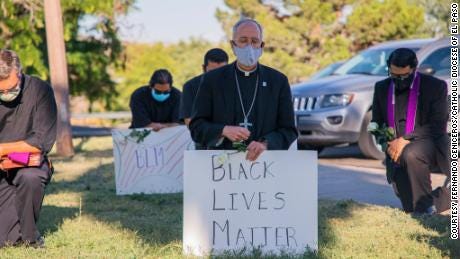
But the guy who replaced Wuerl, current Archbishop Wilton Gregory, actually might be the witness the church needs right now. He forcefully denounced Trump’s visit to the JPII Shrine, and has become a very strong advocate for action on the part of the church in the name of racial justice, comparing the current protests to the Civil Rights Movement of the 1960s. Another witness - another one of the few church leaders who gives me hope for right now - is Bishop Mark Joseph Seitz of El Paso - one of the few bishops who actually has called Donald Trump racist instead of just sucking up to him - who has been out in the streets protesting with everyone else. It’s the sort of thing that someone who took Laudato Si’ to heart might do, I think. But the only reason I think that is because the author of Laudato Si’ called Seitz to thank him.


